Filter by

Managerial Accounting
Student learning styles continue to evolve as we move into the twenty-first century. Students want to learn accounting in the most efficient way possible, balancing coursework with personal schedules. They tend to focus on their studies in short intense segments between jobs, classes, and family commitments. Meanwhile, the accounting industry has endured dramatic shifts since the collapse o…
- Edition
- -
- ISBN/ISSN
- 9781453345290
- Collation
- -
- Series Title
- -
- Call Number
- 657 HEI m
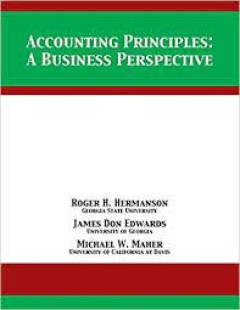
Accounting Principles : A Business Perspective
Accounting Principles: A Business Perspective uses annual reports of real companies to illustrate many of the accounting concepts in use in business today. Gaining an understanding of accounting terminology and concepts, however, is not enough to ensure your success. You also need to be able to find information on the Internet, analyze various business situations, work effectively as a member o…
- Edition
- -
- ISBN/ISSN
- -
- Collation
- -
- Series Title
- -
- Call Number
- 657 HER a

Financial Accounting
This book is intended for an undergraduate or MBA level Financial Accounting course. It covers the standard topics in a standard sequence, utilizing the Socratic method of asking and answering questions.
- Edition
- -
- ISBN/ISSN
- -
- Collation
- -
- Series Title
- -
- Call Number
- 657 FIN

Global Insolvency and Bankruptcy Practice for Sustainable Economic Development
This book is a comparative study of international practices in bankruptcy law, providing perspectives from a variety of specialisms including practitioners, lawyers, bankers, accountants and judges from the United Arab Emirates, the UK and Singapore.
- Edition
- -
- ISBN/ISSN
- 978-1-349-56191-9
- Collation
- XI, 273
- Series Title
- -
- Call Number
- 657 GLO
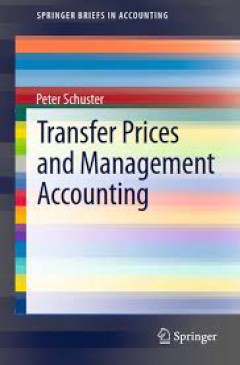
Transfer Prices and Management Accounting
Transfer prices are of dominant importance in company practice and a decentralised organisation, e.g. a profit centre-organisation, is most-widely used. This textbook takes an innovative controversial approach by looking at functions of transfer prices and how different types of transfer prices can fulfil them. Suggestions common in other textbooks will be picked up and it will be shown why the…
- Edition
- 1
- ISBN/ISSN
- 978-3-319-14749-9
- Collation
- X, 71
- Series Title
- SpringerBriefs in Accounting
- Call Number
- -

New Perspectives on the Bank-Firm Relationship Lending, Management and the I…
This book analyses the connections between the banking industry in Europe and the companies it finances. Ferretti specifically studies how these bonds have evolved over time and questions whether now is the time for a change in the relationship’s dynamics. Chapters discuss the role of bank lending in firms’ financing during the recent financial crisis, as well as issues in credit risk manag…
- Edition
- 1
- ISBN/ISSN
- 2523-336X
- Collation
- XI, 184
- Series Title
- Palgrave Macmillan Studies in Banking and Financial Institutions
- Call Number
- -
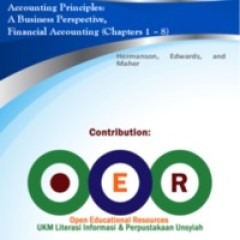
Accounting Principles: A Business Perspective, Financial Accounting (Chapters…
Preface from the eight edition: Philosophy and purpose Imagine that you have graduated from college without taking an accounting course. You are employed by a company as a sales person, and you eventually become the sales manager of a territory. While attending a sales managers' meeting, financial results are reviewed by the Vice President of Sales and terms such as gross margin percentage…
- Edition
- -
- ISBN/ISSN
- -
- Collation
- -
- Series Title
- -
- Call Number
- 657 HER a
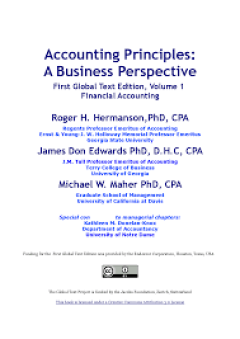
Accounting Principles: A Business Perspective
Overview: Uses annual reports of real companies to illustrate many of the accounting concepts in use in business today. Gaining an understanding of accounting terminology and concepts, however, is not enough to ensure your success. You also need to be able to find information on the Internet, analyze various business situations, work effectively as a member of a team, and communicate your ideas…
- Edition
- -
- ISBN/ISSN
- -
- Collation
- -
- Series Title
- -
- Call Number
- 657
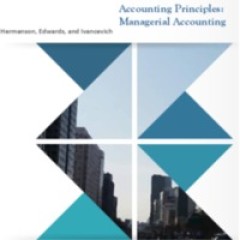
Accounting Principles: Managerial Accounting
Process: Cost systems Learning objectives After studying this chapter, you should be able to: • Describe the types of operations that require a process cost system. • Distinguish between process and job costing systems. • Discuss the concept of equivalent units in a process cost system. • Compute equivalent units of production and unit costs under the average cost procedure. • …
- Edition
- -
- ISBN/ISSN
- -
- Collation
- -
- Series Title
- -
- Call Number
- 657 HER a

Introduction to Financial Accounting - First US Edition
Accounting is often called the language of business because it uses a unique vocabulary to communicate information to decision makers. In this chapter, we will discuss what financial accounting is and briefly introduce how financial information is communicated through financial statements. Then we will study how financial transactions are analyzed and reported on financial statements. Accountin…
- Edition
- -
- ISBN/ISSN
- -
- Collation
- -
- Series Title
- -
- Call Number
- 657 ANN i
 Computer Science, Information & General Works
Computer Science, Information & General Works  Philosophy & Psychology
Philosophy & Psychology  Religion
Religion  Social Sciences
Social Sciences  Language
Language  Pure Science
Pure Science  Applied Sciences
Applied Sciences  Art & Recreation
Art & Recreation  Literature
Literature  History & Geography
History & Geography